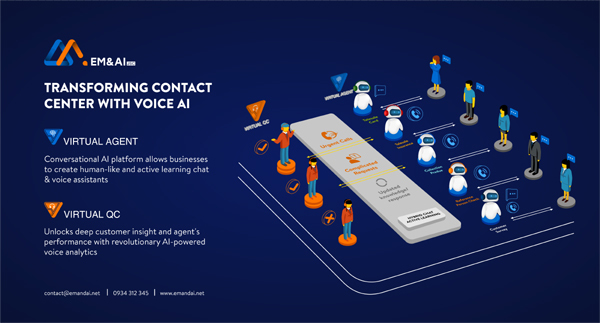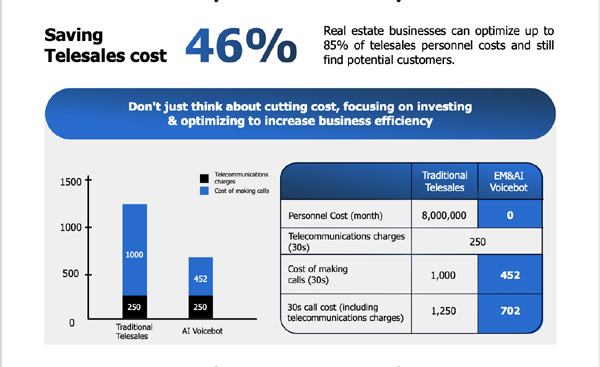Artificial intelligence (AI) is rapidly being integrated into the applications of industry-leading contact centers. It is being utilized to assist executives in proactively identifying and managing problems, as well as providing customers with effective self-service choices. Let's take a deeper look at some real-life use cases.
Conversational AI for telesales and telemarketing
Voice specialists AI has emphasized technology that can automate monotonous operations, allowing humans to focus on high-impact, creative activities like telemarketing and filtering qualified leads in the sales funnel based on their interactions during conversations.
The average handle time and call escalations are reduced by 60% when using a prebuilt virtual assistant powered by EM&AI's VirtualAgent. Namgroup's telesales calls required 50 telesales agents to labor at full capacity for months in order to reach out to potential contacts before using EM&AI VirtualAgent.
 |
Namland's call center was becoming an operational bottleneck, as hiring more agents to meet their demands was neither sustainable nor cost-effective. Namland desired a quick, user-friendly, scalable automatic customer service solution, such as EM&AI. Namland is able to shorten the real estate project's introduction time and filter the needs of more than 3,000 customers in just 6 hours without the assistance of a human agent by utilizing a prebuilt virtual assistant provided by EM&AI.
Improve tier-1 customer service and self-service
No surprise, voice AI is expected to be the next wave of technology that will transform customer service in the coming years. In the post-pandemic world, there has been a great deal of stress and uncertainty in the business world. Customers, unlike in the past, place a high value on help centers. Intelligent voice assistants have the potential to personalize customer engagement and user experience across industries in order to build customer loyalty.
Self-service via interactive voice response (IVR) has come a long way since the days of "press 1 for customer service." The intention to provide self-service has also changed. Early implementations of IVR self-service aimed to keep callers away from agents in order to reduce labor costs. Customers were frequently lost in a confusing maze of menu options, with no solutions to their problems in sight.
Customers can interact directly with virtualagents thanks to EM&AI's comprehensive AI self-service solution. It assists businesses in handling Tier-1 repetitive calls, lowering costs, improving customer experience with fast first contact resolution, and freeing agents to focus on Tier-2 and Tier-3 resolutions with high empathy.
Self-service is now viewed as a channel that can provide convenient and satisfying experiences by customer-focused organizations. They design and optimize self-service so that customers can solve their own problems or easily transfer to an agent for additional assistance. This focus on improving the effectiveness and customer-friendliness of IVR self-service is paying off.
The mix of interactions handled by agents will shift and become more complex as more of these routine tasks are handled by self-service. Many agents will find that spending their time on value-added problem solving rather than mundane, repetitive tasks is more engaging and satisfying.
Agent assistance and evaluation in real time
Active learning and agent assist capabilities power VirtualAgent and RTM. These solutions could analyze calls and learn from the interactions of human agents with customers. It improves the AI customized models and gradually reduces the workload for human agents.
Hybrid Chat is a unique feature of VirtualAgent created by EM&AI. This feature allows employees, virtual assistants, and customers to interact with one another. This promotes the ideal marriage of people and technology. It helps the consultant dealing with the customer to deal with the problem more quickly and accurately by providing or recommending relevant information.
 |
Predictive AI can quickly analyze a customer's intent in a sentence and recommend an appropriate response. Consultants have the option of responding immediately. Furthermore, the ability to self-learn from customer-employee interactions creates a database that virtual assistants can use to suggest more correct answers to consultants.
In terms of monitoring call quality. The typical post-call process can result in results that are both late and inefficient.
EM&AI RTM is a real-time interaction guidance system that employs artificial intelligence to listen to and analyze each call as it occurs. It then gives agents real-time feedback on their soft skills. Real-time, AI-enabled coaching can help save tense interactions by providing immediate feedback and correcting suboptimal behavior.
 |
The positive impact AI can have on agent performance extends beyond real-time interaction guidance to assisting agents with problem-solving. For example, if the AI assistant detects that a caller has a question about pricing or promotions, it will locate the appropriate knowledge base article for the agent.Intelligent agent assistants can help improve first contact resolution rates, accuracy, and handle times, all of which will improve customer experience.
Voice AI solutions offer numerous opportunities to improve various aspects of the call center, including improving customer experience, driving sales, reducing customer attrition, and increasing employee satisfaction. Visit EM&AI's website at emandai.net to learn more about their solution.
EM&AI recently announced an official strategic partnership with CMC Technology & Solution Company Limited – Vietnam's leading Digital Transformation & Cyber Security Solutions Provider. CMC TS will distribute AI platforms developed by EM&AI with CMC TS's advice and implementation. This collaboration will reflect the strength of both parties in promoting a comprehensive automation ecosystem with AI for Vietnamese businesses and organizations.
PV